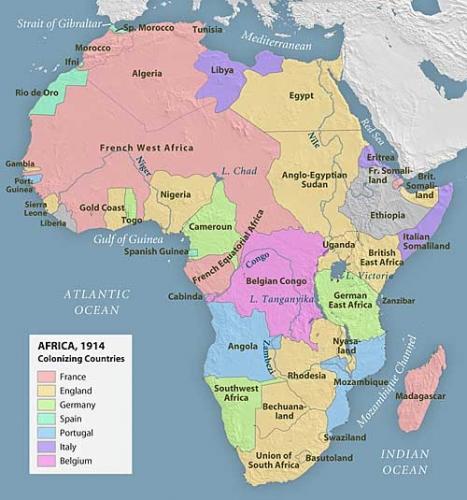Overcoming Colonisation
Before starting to look at any issues or solutions made by people in the African Water and Food discourse, I think it is imperative that we consider the dehumanisation that has systematically occurred to the citizens of this continent by the hand of the white oppressor. Africa has perpetually suffered from the homogenisation of its unique cultures and traditions to a one-size-fits-all image that adheres to the western perception of what this continent should look like. Romanticised or demonised, the way in which it is presented aims to create an idea that it is to be pitied and in dire need of aid. Of course, this aid will undoubtably come from the inevitable ‘heroic’ white saviour that is brave enough to venture into its ‘undeveloped savageness’. My introductory blog aimed to discard these unsavoury images of Africa. It is therefore critical to understand that it is not a place to be pitied, but instead treated as any other continent. There is no desire from its citizens to be ‘saved’ by Western intervention as this neo-colonialist outlook has been proven time and time again to be futile and counterproductive. Be as this may, why is it that this outlook is still considered beneficial? Is it a need to seem useful? A need to feel as though you are helping when in fact your actions are causing more harm? This existential need to be a ‘white saviour’ must be eradicated.
 |
| Figure 1: Map showing how Africa was partitioned up by the West |
Let’s start with the basics. This is a continent with 54 countries, all with differing cultures, climates and histories. However, there is one history that combines almost all- colonisation. This atrocity resulted in the creation of national borders that bore no resemblance or even tried to consider the natural segregations of tribes and communities. The resulting effect of this failure to represent the 835 ethnic groups within Africa was countless ethnic wars, the effects of which are still felt today. Such wars were often started by countries in the Global North, with them favouring one ethnic group, thus creating tension within a country. This leads to the idea of ethnic inequality, resulting in a caste system-esque ranking of ethnicity, leading to inequalities in the distribution of food and water. Rwanda is one such country that has suffered from British colonial rule. Violence has an inextricable link resource scarcity. Under British rule, the Tutsi people were favoured, resulting in the Hutu being treated as second-class citizens in their own country. With suppression of rights being seen as a key catalyst in the creation of revolutions, the Hutu rebellion could have been expected. The act of creating internal conflict helped keep different communities divided, thus keeping the anger off the true oppressor (Britain). This conflict exacerbated issues of food and water scarcity, resulting in issues with agricultural supply as there was no one to grow the crops. It is clear to see how colonial legacy has impacted on Rwanda in terms of its water and food security.
The impacts of the 1884 Berlin Conference that split up Africa are not only felt within countries, but also in terms of inter-country relationships. Trans boundary rivers have been the source of many conflicts. South Africa is one country that has managed its water in such a way that it has negatively impacted on its neighbouring country’s access to water, leading to potential conflicts. This effort by South Africa to achieve water security therefore has negative effects on its neighbours, thus promoting conflicts. Conflict can result in potential aid being blocked, pushing already fragile countries further into food and water insecurity. This trend is seen in many African countries, thus once again showcasing the many negative effects this continent's colonial history continues to have on issues relating to water and food security.
All in all, issues of security in Africa must be thought of within its colonial context. It is unfair to simply pity or look down upon this continent. The West must take accountability for all the harm it has caused. Equally, it is important not to homogenise. There are countries that have plentiful access to water and food, while there are others that don’t, the same as with any continent. Each country must be analysed different as there is no uniform approach that will suit everyone.
This was a good read for me but it has not engaged with the issue of water and food in Africa, which is the theme you set out to explore from you introductory post. Your referencing is good, and your thoughts are well presented, but i struggle to reconcile the conversation with the theme of Water and Food.
ReplyDelete